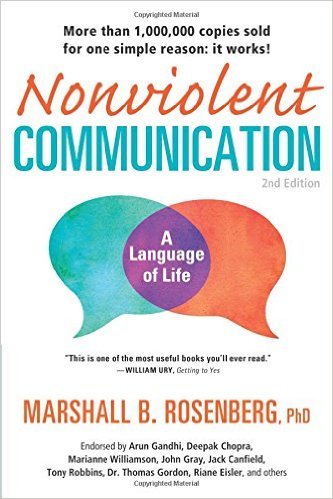Nonviolent communication: making life wonderful!
I haven't even finished reading Marshall Rosenberg's book 'Nonviolent communication: A Language of Life', but I am so excited by this idea that I wanted to share it with you.
The basic idea, as I understand it, is as follows. We, as human beings, have needs. We also experience a range of emotions, depending on whether or not those needs get met. The external state of affairs, and the actions of others, may contribute to whether or not our needs get met, but these things are not themselves the cause of our emotions.
Why this delineation? Because, when we say such things as "I am angry because you did this", the person we are speaking to is more likely to get defensive than to empathize with us, and change their behaviour in order to facilitate the meeting of our needs. Tragically, we have learnt to think and speak in a way that does not lend itself to helping us get our needs met.
A person practicing nonviolent communication would instead say something like "I am feeling angry because I need this, and I am not getting it because..." and may go on to make a specific request (but not demand) that the person change their behaviour. Speaking in this way allows the other person to understand and empathize with what is going on inside of us.
Learning to hear the needs that are being expressed when other people make statements that sound like blame or criticism also allows us to understand and empathize with them better. Rosenberg advises us on how to handle such statements in a way that increases the likelihood that everyone's needs can be met.
One final point.
When we attribute our negative emotions to external circumstances and the actions of others, this leads to a feeling of helplessness. We cannot control the actions of others, and there are many external circumstances that we have very little control over.
However, understanding that the root cause of our emotions is not the actions of others, but rather whether our needs are being met, empowers us to take responsibility for how we feel, and recognize that we can take proactive steps to improve our lives by focusing on getting those needs met, rather than attempting to regulate our emotions by controlling others with manipulative blame language.
I am grateful to @sterlinluxan for pointing me towards this work by promoting it.
If you are interested in what you have read here, I encourage you to buy Rosenberg's book, or find his work on YouTube. You will find deeper and more extensive explanation, practical examples, and some very impressive anecdotes!

Interesting, think i saw this mentioned but, i had forgotten all about it. Gonna check it out, thank you.